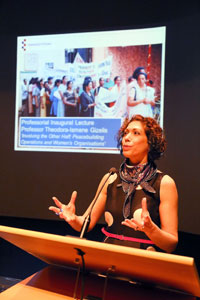11 June 2015
New book finds women are still excluded from peace processes
Colchester Campus

Professor Ismene Gizelis
Professor Ismene Gizelis from the Department of Government at the University of Essex has co-edited a book that finds that 15 years after the passing of the United Nations Security Council’s Resolution 1325 (UNSCR 1325), women are still excluded from peace processes and their protection remains limited.
Gender, Peace and Security: Implementing UNSCR 1325 has been co-edited with Louise Olsson, Head of Research and Policy at the Folk Bernadotte Academy, the Swedish Agency for Peace, Security and Development and was launched this week at Research for Peace in Sweden.
Adopted in 2000, UNSCR 1325 was the first thematic resolution on women, peace and security. The resolution sought to address the lack of participation of women, both in peace processes and in peace operations, and the lack of awareness of the different needs of protection that men and women have during an armed conflict and its resolution. UNSCR 1325 also recognised that how peace was implemented could have different effect for men’s and women’s respective access to resources and power.
The book offers new insight into the challenges and progress made in the implementation of the resolution, focusing on its three key areas – women’s participation in peace operations and peace processes, women’s protection during conflict, and gender mainstreaming of security and development. It also assesses the work involved in translating the policy commitments into action.
Speaking at the launch of the book, Professor Gizelis said, “What research suggests is that gender equality is an important contributing factor to both peace and development. Gender mainstreaming is important because it leads to more prosperous societies with less conflict….it should be about the transformation of societies and institutions, and not just about ‘women’s stuff’”.
...more news releases